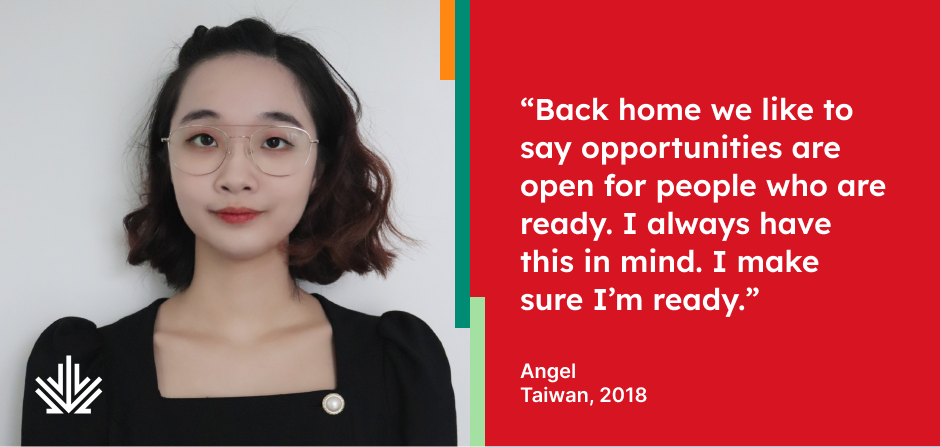From an interview with Hsiao-Yuan (Angel) Sun.
Hsiao-Yuan Sun (Angel) describes herself as Taiwanese, born in Korea, and raised in China. She studied at a British international school, an American international school, and a Canadian international school where she learned about Canada. In 2018, ten days before the start of her Canadian studies, Angel had to unexpectedly change her plans, so she changed her program and found a new school in a week and a half. Angel is now currently in her third year at the University of Toronto (U of T) studying industrial relations and human resources. In this interview, she shares her unique HR perspective on studying in Canada, finding part-time work, and being ready when opportunity knocks.
I was moving to Canada to study science and aviation and had been accepted at the University of Waterloo, but my medical examination was rejected. I was in Korea at the time and had the necessary medical procedure done and sent my follow up examination, but it was also rejected. There was only a week and half left before school started, so I had to find a new school to go to.
I had originally applied to the University of Waterloo, Queen’s University, Western University, and York University. I also applied to Seneca College (because they had an aviation program), and they told me I could apply to Humber College or Sheridan College for the same amount of money. Even though I wanted to go to a university not a college, I thought, why not? I didn’t know this would actually save me in the end.
Sheridan College had offered me an international student scholarship, so I did my first year at Sheridan in Mississauga, then transferred to the University of Toronto where my older sister was studying.
Keep your documents in order
Getting my student visa was fairly easy, because my sister had already gone through the process. I knew all of the documentation you need to study in Canada, so when I applied for my study permit, I did so directly online right after I got my offer. My visa came around two weeks after I applied.
My main problem was that my student visa was for the University of Waterloo, but I had now switched to Sheridan College. When I landed at the airport in Toronto, I showed the border services all of my documentation and explained my situation. However, they requested more documents. I had to show them all the email communications I had with Sheridan, my new offer and payments for my residence and tuition. So I was standing there going into my phone, checking my inbox trying to find all those documents while all of the other students came in, got their study permits and left. I eventually got my study permit. I faced the same situation when I returned to Canada the next two years, but luckily I got my study permit each time.
This coming March I’ll have to apply for an extension for my study permit. I’ve heard people say that, if you’ve been studying Canada already, extending an extra year isn’t that hard.
Don’t feel that your only job is to be a student.
In China or in Korea especially, you’re not supposed to work as a teen unless you’re really in need of money. Your job is just to study; it’s taken very seriously in Korea. Along with school, you also have academies outside of school that tutor you in what you’re learning in school. Except for when you’re sleeping or eating, you’re just supposed to study.
But in Canada, you can take on part-time jobs, as well as do some extracurriculars and sports. I currently have four part-time positions, and I also have multiple interviews from different companies on and off campus for the upcoming summer.
Working provides experience that you can only get by actually doing a real job. Because you’re paid to do a job, you have greater responsibilities and you have to care about what you’re doing. The way I speak to my manager at a job is different from speaking with someone in a club at school. There’s a lot to learn from extracurricular groups, but it’s just totally different from what you learn on the job.
Finding a job: challenges and opportunities
International students coming from China or South Korea (especially if they are under 18, like I was) may find it difficult to find a job when they first arrive because they lack work experience.
During COVID, it’s been extremely difficult for international students to find internships, mainly because a lot of smaller companies rely on grants from the Canadian government to fund intern positions. When I applied for intern positions during my first year, second year, and even right now, hiring managers would often say, “You have to qualify for the Canadian summer student program,” which doesn’t include international students. Larger companies and corporations, like the major banks, don’t usually have the Canadian grant requirement. Also, since last summer the Canadian job market has been recovering. Many companies have called back employees laid off due to COVID, and are hiring new employees.
On-campus and off-campus jobs for international students
If you meet all of the requirements for off-campus work, you may work up to 20 hours a week during regular school terms and more during breaks between two full-time semesters. Every year, U of T has around 3,500 work study positions for full-time students. International undergraduate and graduate students studying on a full-time basis are eligible to work on campus, subject to federal government requirements.
Angel’s top 5 tips for studying in Canada
1. Don’t be shy. Ask for help
In Canada, if you have a problem or a question you can literally just go up to someone and ask because chances are they will help you. When I came to Canada a funny thing happened. It was my first time not living with my parents and back in China we don’t use clothes dryers; we only use the washing machine and we do natural drying. So we have to use fabric softener in the washing machine, but when I went to the supermarket here I could only see the paper sheets you put in the dryer. I was very confused.
There was a mom shopping with her baby. She was choosing laundry detergents, and I just went up to her and said, “I’m so sorry but can you help me with this?” She looked at me funny, and then asked if I lived in residence. I said, yes and she stood there for five minutes explaining all of the products. She even explained how to use the dryer. I feel like in Canada you can just ask anyone and then they’re very open to helping you.
2. Understand the difference in money
Canada is still a cash world compared to China. Back in China, we have everything on our phone. We have a QR code that’s connected to all of our banks and, when we want to buy something, we just swipe our phone. So when I go out in China I don’t even bring my wallet; I just bring my phone.
Here, you use cash, debit, or a credit card. That’s what I use now. The perception in China is that if you use credit, you’re poor and don’t have money, so you have to borrow it from the bank. I was like, I have enough money, why do I need a credit card? In Canada, using my credit card is easy, and you can get extra points that you can spend as money. It’s also important to build a credit history and credit score in Canada if you plan to rent, buy a car, or get a mortgage. My family is thinking of buying a condo in Toronto, so I use my credit card for most purchases.
3. Check store flyers for sales
One Canadian dollar is worth roughly five RMB in China. Five RMB can buy you a lot of stuff in China, but not in Canada. So when students first come to Canada and calculate the currency exchange, everything seems very expensive for us. I heard about coupon apps that have all the flyer information and specials from grocery stores, including which days of the week these grocery stores have discounts for students. You can save a lot of money, and that’s very useful for newcomers and international students. My grocery bill is much less than what some of my friends pay.
4. Take a part-time job
Next to studying, the most important thing for me was finding part-time jobs. Back home, you are not supposed to find a job until you are over 19 years old. It is very different in Canada. There are lots of opportunities for students who have never worked before. You definitely should try it. Get Canadian experience because, in Canada, it’s about your experience. ven if it’s retail experience, or customer service, it’s Canadian experience that’s crucial when looking for future jobs.
5. Meet new people
Because Canada is a totally different place, you have to build your network. I reached out to my professors, to other classmates, and I tried different positions, I tried different extracurricular clubs, and that helped me meet more people, get more connections. I still have connections from Sheridan College today.
Networking in Canada works
In Canada, you can just reach out to people on LinkedIn, have a coffee chat, and ask them about their career. You may send requests to ten people and, even if only one person gets back to you, that person can be very helpful. I had a project where I was comparing the differences between HR in Canada and HR in China. I reached out to around 30 HR professionals on LinkedIn and around eight people got back to me who were willing to do a coffee chat. I didn’t know them, nor did my connections know them, but they took the time to help me. I just saw their profile and reached out. Remember, always send an introductory message and be polite, of course. People will help you out.
Adapting your approach to a changing job market
The job market will continue to change over the next few years, so don’t lock yourself into the type of person that you think is right for the current world. Many students are unwilling to step out of the field that they think is perfect for them, but when you’re writing your Canadian-style resume, don’t only list your relevant work experience. You can also bring in skills you picked up during your extracurricular activities and hobbies, and anything else that will help you stand out.
When you’re interviewing for a job or negotiating your wages, you can now also negotiate if you want to work from home or work in the office. Many large companies are moving to a work-from-anywhere model, allowing employees to choose whether they work from home, from the office, or a hybrid blend of the two.
I’m considering doing a master’s program before getting my Post Graduation Work Permit (PGWP). Based on my research and coffee chats with HR professionals, it seems some Canadian companies are reluctant to hire an international student for an HR position. To them, it feels like bringing in someone from outside the family to tell them how to manage and take care of the company. According to some people I’ve spoken to, international HR students have a better chance if they start their career at a small startup company or find a position at an international company.
One way to solve that issue is to get a master’s degree, or even a PhD. The extra degree and extra knowledge may be an advantage over domestic candidates.
Do what you need to do to be ready
Back home we like to say that opportunities are open for people who are ready. I always have this in mind. I make sure I’m ready. When I first came to Canada as a first-year student, I started to apply for on-campus part-time positions. I did a lot of interviews and I got a lot of rejections, but I continued to submit more applications. At the end of my first semester, I was actually able to get two part-time positions. Many people start applying for internships after their second year. But in my first year, I said to myself, “Just start applying.”
I’ve been involved in many extracurricular groups and have had multiple part-time jobs. I like to try everything out, including job positions and courses––even just for fun/ I want to try everything and that attitude has really helped me. I am building my network, as well as my work and leadership experience. If you’re not ready, then you won’t be able to take an opportunity, even if it’s standing right in front of you. Just continue trying, because when you’re ready, the opportunity is going to be yours.




